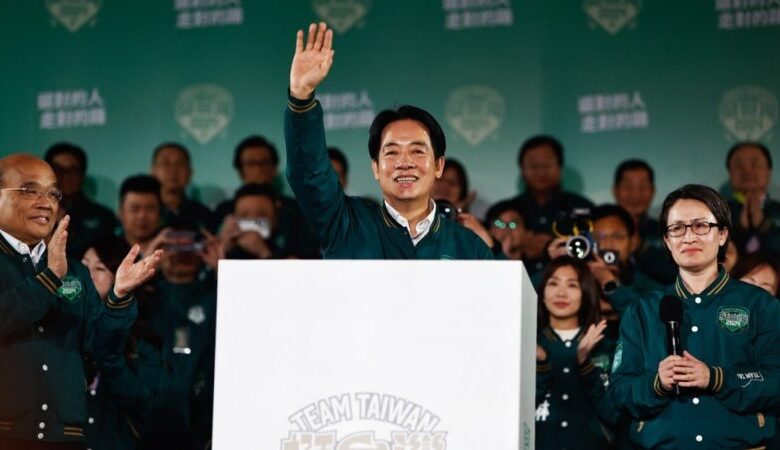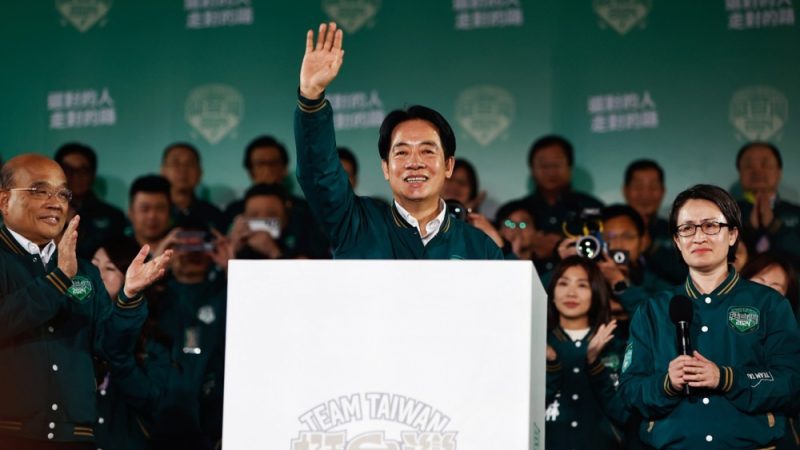
Taiwan Braces for Americas Election
Taiwan braces for americas election – Taiwan braces for America’s election; the outcome will significantly impact its economy, geopolitics, and cross-strait relations. This year’s US election holds immense consequences for Taiwan, deeply intertwined with both the US and China economically and strategically. The island nation’s future hinges on the policies of the next US administration, creating a climate of anticipation and uncertainty.
From the potential shifts in US-China trade relations impacting Taiwan’s tech sector to the implications for its defense posture, the stakes are incredibly high. Public opinion in Taiwan is sharply divided, with varying perspectives on the best approach to navigate this complex geopolitical landscape. This uncertainty extends to cross-strait relations, with China’s response to the election outcome remaining a critical unknown factor.
Taiwan’s Economic Dependence on US-China Relations

Taiwan’s economy is intricately woven into the fabric of US-China relations, making it highly susceptible to shifts in the geopolitical landscape. Its success hinges on a delicate balancing act, navigating the complex trade dynamics between these two global superpowers. Any significant alteration in the US-China relationship, particularly following a US election, can trigger substantial repercussions for Taiwan’s economic stability and future growth.Taiwan’s vulnerability stems from its heavy reliance on exports, particularly in technology and manufacturing.
These sectors are directly exposed to the fluctuating demands and trade policies of both the US and China. The island’s prosperity is not solely determined by its internal economic performance but also by the external forces shaping its relationships with these two major economic powers.
Vulnerable Economic Sectors in Taiwan
Several key sectors within the Taiwanese economy are particularly vulnerable to changes in US-China relations. The semiconductor industry, a cornerstone of Taiwan’s economic strength, is heavily reliant on both US technology and the Chinese market for its products. Similarly, the electronics manufacturing sector, which includes the production of smartphones, computers, and other consumer electronics, faces significant risk due to its intertwined supply chains spanning across the US and China.
Furthermore, the machinery and precision instruments industry, crucial for Taiwan’s technological advancement, is also susceptible to trade disruptions stemming from altered US-China relations. A shift in US policy, for instance, could lead to supply chain disruptions, increased tariffs, or reduced market access for these vital sectors, triggering economic instability in Taiwan.
Comparison of Taiwan’s Trade Relationships with the US and China
Taiwan enjoys robust trade relationships with both the US and China, but these relationships present distinct vulnerabilities. The US is a major market for Taiwan’s high-tech exports, particularly semiconductors and electronics. However, increased US-China tensions could lead to restrictions on technology transfers or increased tariffs on Taiwanese goods, harming this vital export market. Conversely, China is a significant source of raw materials and a major market for many Taiwanese products.
However, reliance on the Chinese market exposes Taiwan to the risks of political pressure and potential trade restrictions imposed by the Chinese government. This dual dependence creates a precarious situation for Taiwan, where any negative shift in either relationship could have significant economic consequences.
Hypothetical Scenario: Impact of a Significant Change in US Policy Towards China
Let’s imagine a scenario where a significant shift in US policy leads to a sharp escalation of tensions with China, resulting in substantial trade restrictions. This could manifest as increased tariffs on Taiwanese goods exported to the US, impacting the semiconductor and electronics industries significantly. Simultaneously, China might retaliate by imposing its own tariffs or restrictions on Taiwanese exports, further squeezing Taiwan’s already strained economic situation.
The resulting decline in export revenue could lead to job losses, reduced investment, and a slowdown in economic growth. Such a scenario would highlight the inherent risk associated with Taiwan’s over-reliance on these two major economies. The ripple effects would extend beyond the directly impacted sectors, affecting related industries and potentially leading to a broader economic downturn. A real-life parallel could be drawn from the US-China trade war of 2018-2020, where tariffs on goods affected various global supply chains, causing uncertainty and disruption.
Top 5 US and Chinese Imports from and Exports to Taiwan
The following table illustrates the top five imports and exports between Taiwan, the US, and China. Note that these figures can fluctuate year to year. This is a simplified representation and the actual values can be obtained from official trade statistics.
Taiwan’s watching the US election closely, bracing for potential shifts in policy. It’s a pretty intense time, and honestly, sometimes I need a distraction, like the news that a winning Powerball ticket for the $2.04 billion jackpot was sold – check it out here: winning powerball ticket for 2 04 billion jackpot sold. Anyway, back to the election, the implications for Taiwan are significant, regardless of the outcome.
| Category | US Imports from Taiwan | US Exports to Taiwan | China Imports from Taiwan | China Exports to Taiwan |
|---|---|---|---|---|
| 1 | Integrated Circuits | Electronic Components | Integrated Circuits | Electronic Components |
| 2 | Computers | Machinery | Computers | Raw Materials |
| 3 | Telecommunications Equipment | Chemicals | Telecommunications Equipment | Machinery |
| 4 | Optical Instruments | Plastics | Optical Instruments | Plastics |
| 5 | Medical Equipment | Agricultural Products | Medical Equipment | Agricultural Products |
Geopolitical Implications for Taiwan

The outcome of the US presidential election carries profound geopolitical implications for Taiwan, significantly impacting its security and its relationship with both China and the wider international community. The level of US military commitment, the nature of diplomatic engagement, and the overall regional stability are all directly affected by the occupant of the Oval Office. Understanding these implications requires careful consideration of various scenarios and the actions of key players.
Potential Military Implications Based on US Election Outcomes
A decisive victory for a pro-Taiwan candidate might embolden Taiwan’s government to adopt a more assertive stance towards China, potentially leading to increased military exercises and a heightened risk of escalation. Conversely, a victory for a candidate perceived as less supportive of Taiwan could embolden China to increase its military pressure, including more frequent incursions into Taiwan’s air defense identification zone (ADIZ).
The level of US military support, including arms sales and potential military intervention in a conflict, is a crucial factor in shaping Taiwan’s response. For example, a robust US military presence in the region, signified by increased naval patrols and joint military exercises, could deter China from taking aggressive actions. Conversely, a perceived weakening of the US commitment could incentivize China to take more risks.
A situation mirroring the 1996 Taiwan Strait Crisis, where the US sent naval assets to deter China, serves as a relevant case study, highlighting the pivotal role US actions play in influencing the military calculus of both sides.
Taiwan’s Responses to Different US Election Outcomes
Taiwan’s responses will be multifaceted and strategic. A strong US commitment might encourage Taiwan to strengthen its own defense capabilities, investing more in asymmetric warfare strategies and enhancing its intelligence gathering capabilities. This could involve further investment in advanced missile systems, cyber warfare, and irregular warfare training. Conversely, a less supportive US administration might prompt Taiwan to pursue a more conciliatory approach towards China, seeking to de-escalate tensions through diplomatic channels and prioritizing economic cooperation.
This could involve increased engagement in cross-strait dialogue, focusing on areas of mutual economic interest, potentially at the cost of some sovereignty considerations. Taiwan might also seek to strengthen alliances with other countries in the region, such as Japan, to create a more robust security network independent of US support.
Reactions of Key Geopolitical Players
Beyond the US and China, other key players will react to the US election results. Japan, a crucial US ally and a close neighbor of Taiwan, would closely monitor the situation, potentially adjusting its defense posture and diplomatic strategies based on the new US administration’s approach to the Taiwan Strait. Similarly, other regional powers like South Korea, Australia, and India will assess the implications for their own security interests and adjust their foreign policy accordingly.
The European Union, while geographically distant, will also observe the developments, particularly regarding the impact on global trade and the potential for regional instability. Their responses will likely be guided by their overall assessment of the stability of the Indo-Pacific region and the implications for their own economic and strategic interests.
Comparative Analysis of Taiwan’s Security Posture Under Different US Administrations
Historically, Taiwan’s security posture has fluctuated depending on the US administration’s approach to China. Under administrations perceived as more supportive of Taiwan (e.g., the Reagan administration), Taiwan enjoyed a stronger security umbrella and a more assertive stance. Conversely, under administrations perceived as more cautious (e.g., certain periods of the Obama administration), Taiwan adopted a more cautious approach, prioritizing economic development and diplomatic engagement to manage the risk of conflict.
This pattern demonstrates the direct correlation between the level of US commitment and Taiwan’s willingness to take risks in its relationship with China. This pattern highlights the critical role of US policy in shaping Taiwan’s security strategy and its ability to navigate the complex geopolitical landscape of the Taiwan Strait.
Public Opinion and Political Sentiment in Taiwan
The US presidential election holds significant weight in Taiwan, deeply impacting its political landscape and economic trajectory. Public sentiment is a complex tapestry woven from anxieties about cross-strait relations, economic dependencies, and differing views on the best approach to navigating the geopolitical chessboard. While a clear majority favors maintaining strong ties with the US, the intensity and nature of that support vary considerably across the population.Taiwanese society is not monolithic in its views on the US election.
The prevailing sentiment is one of cautious optimism, tempered by a realistic understanding of the potential challenges. The outcome directly affects Taiwan’s security and economic future, prompting a wide range of reactions and interpretations.
Diverse Perspectives on the US Election
The impact of the US election on Taiwan is viewed through several lenses. Pro-independence supporters tend to favor a Democratic administration, perceiving it as more supportive of Taiwan’s self-determination. Conversely, some within the pro-unification camp might see a Republican administration as potentially less confrontational towards mainland China, although this is a nuanced perspective. Many Taiwanese, regardless of their political leaning, prioritize economic stability and are concerned about the potential disruption of cross-strait trade relations, regardless of who wins.
A significant segment of the population focuses on the broader geopolitical implications, particularly concerning the potential for increased military tensions in the region. Their primary concern is the maintenance of peace and stability, regardless of the specific political leanings of the US administration.
Impact of the US Election on Taiwan’s Political Landscape
The US election’s outcome can significantly influence the upcoming Taiwanese elections. For example, a perceived shift in US policy towards China could bolster the pro-independence camp or, conversely, embolden the pro-unification forces depending on the specifics of the shift. The level of US military support pledged to Taiwan is a key factor impacting voter decisions. Increased military commitment from the US could strengthen the position of the Democratic Progressive Party (DPP), while a more ambiguous stance could benefit the Kuomintang (KMT).
The overall economic climate, largely influenced by US-China relations, will also play a significant role in shaping voter preferences. Economic anxieties could lead voters to prioritize stability over ideological considerations.
Hypothetical News Article Headlines Reflecting Potential Scenarios, Taiwan braces for americas election
* “Biden’s Victory Solidifies US-Taiwan Ties, Boosting DPP in Upcoming Elections” (Scenario: A Democratic victory leads to increased US military support and reinforces pro-independence sentiment).
“Trump’s Re-election Spurs Cautious Optimism, KMT Gains Momentum in Taiwan” (Scenario
A Republican victory leads to a more ambiguous stance on Taiwan, benefiting the KMT).
“US Election Uncertainty Creates Economic Jitters in Taiwan, Shaping Voter Decisions” (Scenario
Taiwan watches the US election closely, as the outcome significantly impacts cross-strait relations. The implications extend beyond immediate policy shifts; consider the ripple effects on global issues like human rights, especially given the Supreme Court’s recent decision and what it means for diversity in higher education, as explained in this insightful article: what is the effect of the supreme courts affirmative action ban.
This decision, in turn, could influence future US foreign policy, impacting how Taiwan is viewed and supported on the world stage.
A highly contested election creates economic uncertainty, driving voters towards stability-focused candidates).
“Bipartisan US Consensus on Taiwan’s Defense, Easing Tensions Across the Strait” (Scenario
Taiwan’s bracing for the US election, naturally, given the island’s precarious geopolitical position. The outcome will significantly impact cross-strait relations, especially considering China’s recent announcement – check out this article for the details: china announces it seeks calm end to trade war as markets tank and currency hits 11 year flatline – which hints at economic anxieties amidst global uncertainty.
Ultimately, Taiwan’s future hangs in the balance, dependent on both domestic politics and the international landscape.
Regardless of party, the US maintains a strong commitment to Taiwan’s defense, reducing cross-strait tensions).
Cross-Strait Relations in the Aftermath of the US Election
The US presidential election significantly impacts cross-strait relations, influencing China’s approach to Taiwan and the overall geopolitical dynamics in the region. The differing foreign policy priorities and rhetoric of the Republican and Democratic parties create distinct scenarios for how China might respond to a US administration shift. Understanding these potential responses is crucial for analyzing future stability and conflict risks in the Taiwan Strait.
Potential Chinese Policy Shifts Following a US Election
A Republican victory, historically characterized by a more assertive stance towards China, might lead to increased Chinese military activity around Taiwan. This could manifest as more frequent air incursions into Taiwan’s Air Defense Identification Zone (ADIZ), intensified naval exercises, or even escalated cyberattacks targeting Taiwanese infrastructure. Conversely, a Democratic victory, often associated with a more multilateral and diplomatic approach, could lead to a period of relative de-escalation, although this is not guaranteed.
China might choose to wait and observe the new administration’s policies before deciding on its course of action. However, regardless of the US election outcome, China’s fundamental goal of eventual reunification with Taiwan remains unchanged. The approach, however, could vary considerably.
Comparison of Potential Chinese Responses to Different US Election Outcomes
A Republican administration’s emphasis on strengthening alliances and containing China could prompt Beijing to adopt a more assertive strategy. This could include accelerated military modernization, a more aggressive diplomatic campaign to isolate Taiwan internationally, and increased economic pressure through trade restrictions or investment limitations. Conversely, a Democratic administration, potentially prioritizing diplomacy and international cooperation, might see China adopting a more cautious approach initially.
However, even under a Democratic presidency, China is unlikely to abandon its ultimate aim of reunification and may pursue it through other means, such as economic coercion or intensified psychological warfare. The level of military activity could remain high, depending on other factors such as Taiwan’s own actions and regional stability.
Impact of the US Election on Cross-Strait Communication and Dialogue
The US election’s outcome profoundly affects the level and nature of cross-strait communication. A Republican victory, with its focus on countering China, could significantly reduce the likelihood of formal dialogue or negotiations between Beijing and Taipei. This is because China may see engagement with Taiwan as a sign of weakness, particularly if it perceives the US as supporting Taiwan’s independence.
A Democratic victory, emphasizing diplomacy, might create a slightly more conducive environment for dialogue, although the success of any such dialogue would depend on the specific policies of both the US and Chinese governments. The level of trust between the two sides, already severely strained, plays a major role in determining the viability of communication.
Hypothetical Scenarios: China’s Responses to Varying US Policies
To illustrate the range of potential responses, consider these hypothetical scenarios:
- Scenario 1: Increased US Arms Sales to Taiwan + Republican Victory: China could respond with significantly increased military exercises near Taiwan, including live-fire drills and simulated amphibious assaults, to demonstrate its resolve and deter further US support for Taiwan’s defense capabilities. This could potentially lead to heightened tensions and increased risk of miscalculation.
- Scenario 2: US Diplomatic Engagement with China on Taiwan + Democratic Victory: China might initially respond cautiously, potentially engaging in limited dialogue with the US while simultaneously maintaining pressure on Taiwan through economic measures, such as restricting Taiwanese access to certain Chinese markets or imposing stricter regulations on Taiwanese businesses operating in China.
- Scenario 3: US Recognition of Taiwan as Independent + Any Victory: This highly improbable scenario would likely trigger an immediate and forceful response from China, potentially including military action. The response could range from a blockade of Taiwan to a full-scale invasion, depending on the level of support Taiwan receives from other countries.
Taiwan’s Preparedness for Different Scenarios: Taiwan Braces For Americas Election
Taiwan’s strategic position necessitates meticulous planning for various geopolitical contingencies, especially those stemming from US-China relations and the ever-evolving cross-strait dynamic. The outcome of US elections significantly impacts this delicate balance, prompting Taiwan to develop comprehensive contingency plans to navigate potential shifts in the regional power landscape. These plans address a spectrum of scenarios, from heightened tensions to unexpected shifts in US policy.Taiwan’s existing contingency plans are multifaceted, incorporating economic, military, and diplomatic strategies.
These plans are not publicly available in detail for obvious security reasons, but analyses suggest a focus on economic diversification to reduce over-reliance on any single trading partner, bolstering defensive capabilities, and maintaining strong diplomatic ties with like-minded countries. The effectiveness of these plans, however, depends heavily on accurate forecasting and adaptability to rapidly changing circumstances.
Strengths and Weaknesses of Taiwan’s Preparedness
Taiwan possesses significant strengths in its preparedness. Its robust economy, technological prowess, and resilient democratic institutions provide a solid foundation for weathering geopolitical storms. The nation’s long experience with managing cross-strait tensions has also honed its crisis management capabilities. However, weaknesses exist. The island’s dependence on specific sectors like semiconductors for economic growth creates vulnerabilities.
Furthermore, while military modernization is underway, a significant asymmetry in military power with China remains a considerable challenge. The effectiveness of Taiwan’s diplomatic efforts also depends on the consistent support of its allies, a factor subject to shifts in global politics.
Steps Taiwan Might Take to Mitigate Negative Consequences
To mitigate potential negative consequences stemming from the US election, Taiwan is likely to pursue a multi-pronged approach. This includes further diversification of its economic partnerships, actively engaging in diplomatic initiatives to strengthen international support, and continuing its investment in defense modernization. A focus on strengthening resilience within its own economy and society, perhaps by building stronger domestic supply chains and enhancing cybersecurity, would also be crucial.
Additionally, maintaining clear and consistent communication with the US and other key players will be vital to managing expectations and reducing misunderstandings. Examples include actively participating in international forums and maintaining open channels of communication with relevant governments.
Potential Impact of Heightened Cross-Strait Tension on Taiwanese Society
A significant escalation in cross-strait tensions could have profound impacts on Taiwanese society. Economic disruption is a major concern, with potential damage to trade, investment, and tourism. Social unrest and uncertainty could also increase, affecting public confidence and potentially impacting daily life. The psychological toll of heightened military activity and the ever-present threat of conflict would be significant.
History provides examples, such as the Third Taiwan Strait Crisis in 1996, which led to significant economic uncertainty and increased public anxiety. While the specifics of any future crisis would differ, the potential for widespread societal impact remains a key consideration in Taiwan’s contingency planning.
Ultimately, Taiwan’s future trajectory is inextricably linked to the results of the American election. The island nation’s economic vulnerability, its geopolitical position, and its delicate relationship with mainland China all make it a key player in the unfolding drama. Whether the next US administration prioritizes engagement or containment, Taiwan’s proactive planning and adaptability will be crucial in mitigating potential risks and seizing opportunities in the years to come.
The coming months will undoubtedly be a period of intense scrutiny and careful navigation for Taiwan.




